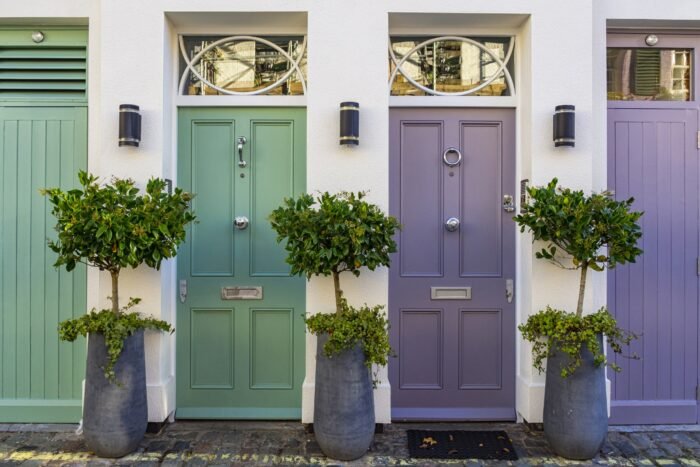Social Housing in the UK – Council and Housing Associations
Social housing, also known as council flats or council houses, is a significant component of the housing market in the United Kingdom. These are apartments or houses managed and rented out by local authorities (councils) or non-profit organisations (usually housing associations). They are primarily intended for low-income individuals who cannot afford private renting or purchasing. This system aims to provide affordable and stable housing for those in financial need. However, due to limited availability and long waiting lists, the social housing system often becomes a subject of controversy and criticism.
Options for Tenants of Council Properties
Tenants living in social housing in the UK have various options depending on their life and financial situations. Firstly, they can continue renting their property from local authorities or non-profit organisations if they meet the qualifying criteria. Alternatively, they can apply for the right to buy their social housing property through the government’s Right to Buy program, which allows tenants to purchase their apartment or house at a discounted price. Individuals interested in buying must meet specific conditions, such as a lengthy tenancy period and property location regulations. However, there are also other options, such as Shared Ownership, which allow partial ownership of the property. For some individuals, especially those with limited financial means, these programs can provide an opportunity for housing stability and improved living conditions.
Purchase of Social Housing – Right to Buy Program
The Right to Buy program is a government initiative in the UK that allows tenants of social housing to buy their apartment or house from local authorities. Tenants eligible for this program can purchase their property at a discounted market price, depending on the duration of their tenancy and the type of property. This program aims to promote homeownership, enabling tenants to become owners of their own home and increase housing stability. However, the Right to Buy program is subject to certain limitations and requirements, and its availability may vary depending on the region and local authority policies.
Mortgages for Purchasing Council Properties – Right to Buy Mortgages
A Right to Buy Mortgage is a type of mortgage available to individuals participating in the Right to Buy program who wish to purchase a property they have been renting from their local council. There are some differences between a Right to Buy Mortgage and a standard mortgage in the UK.
- Deposit: With a Right to Buy Mortgage, a large deposit is not always required, and some lenders may offer mortgages with no own deposit or with a minimal required deposit.
- Available Deals: Mortgages for purchasing council properties under the Right to Buy scheme often have a low loan-to-value ratio (LTV) due to significant discounts from local authorities. Therefore, borrowers often have access to more competitive rates than standard mortgages on the open market with a low deposit.
- Credit Criteria: The credit criteria for Right to Buy Mortgages typically do not differ significantly from those for standard property purchases.
- Application Process: Again, the application process for a Right to Buy Mortgage is similar to that of a normal property purchase. In addition to the standard verifications, lenders typically need to verify the official Right to Buy offer from the council, detailing the purchaser, property valuation, discount amount, and final purchase price.
It is worth noting that every mortgage, including Right to Buy Mortgages, is subject to assessment of the borrower’s affordability and the terms and procedures set by individual lenders. Before deciding on a Right to Buy Mortgage, it is advisable to compare different offers and consult with financial experts to obtain appropriate assistance and advice.
Did You Know?
To qualify for the Right to Buy scheme in England, a tenant must meet certain conditions, such as renting a property from their local council for a specified period, typically ranging from 3 to 5 years minimum. It should also be noted that not all social housing properties are covered by the Right to Buy scheme, and restrictions on the type of properties may vary by region.
The Process of Purchasing Council Properties – Right to Buy Purchase
The process of purchasing a property under the Right to Buy scheme involves several steps. First, the tenant must submit an application to purchase their flat or house to the social housing provider, usually the local council. After submitting the application, the housing provider verifies the tenant’s eligibility for the program. If the tenant is approved, they will receive an offer to purchase the property at a discounted market price. The tenant then has a specified time to accept the offer and submit a formal application for purchase. Upon acceptance of the application, payment of the relevant fees and completing the conveyancing process, ownership of the property is transferred to the tenant.
It is worth noting that this process may vary depending on the region and the individual rules applicable in the specific location. It is also advisable to consult with the social housing provider or seek advice from an advisor to obtain accurate information about the property purchase procedure under the Right to Buy program.
In the case of purchasing a property under the Right to Buy program, there is usually a “5-year rule” after finalising the purchase, during which you have certain restrictions and limitations on selling or transferring ownership. This often involves the requirement to repay all or part of the discount received.
For example, if John purchased a social housing property using Right to Buy and decides to sell it after three years, he must repay a portion, or all of the discount received. This means that if he received a discount of £80,000 and decides to sell the property 2 years before the initial 5-year period ends, he must repay a portion of that amount, e.g., £32,000 (£80,000 / 5 * 2). Therefore, it is important for individuals utilising the Right to Buy program to understand these terms before making a purchase to avoid unexpected costs in the future.
Purchase from a Housing Association – Right to Acquire
The Right to Acquire is a program similar to Right to Buy, which allows tenants of social housing in England (excluding Scotland, Wales, and Northern Ireland) to purchase their flat or house from the social housing provider, such as a housing association. However, compared to Right to Buy, Right to Acquire applies to properties built or acquired by housing authorities after 31 March 1997. This program offers similar benefits, enabling tenants to transition from renting to homeownership and increase housing stability by purchasing the property they have been renting. The restrictions and rules of the Right to Acquire program may vary depending on the region and the policies of local authorities and housing agencies. Additionally, the level of discounts offered compared to Right to Buy is much lower.
Discover what we offer
Through our services, we’ll help you swiftly and efficiently choose the right mortgage to achieve your goal of buying a property from the council or housing association using the Right to Buy or Right to Acquire scheme. As a whole of market mortgage broker, we have access to many reputable lenders offering competitive terms for mortgages to purchase such properties. With our experience and support, you’ll find the most suitable offer tailored to your needs and financial circumstances.
Our usual fee for handling a mortgage for the purchase of a property under the Right to Buy or Right to Acquire program is £499. Upon commencing work on the application, a non-refundable administrative fee of £100 is charged, with the remaining portion payable upon the approval of the mortgage offer. The initial consultation and affordability assessment are free of charge and non-binding.
In some situations, the fee may be higher, ranging up to £599-£799, especially for more complex cases.
Your home may be repossessed if you do not keep up repayments on your mortgage.









